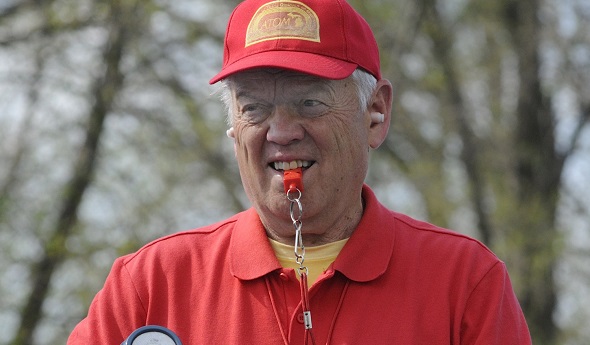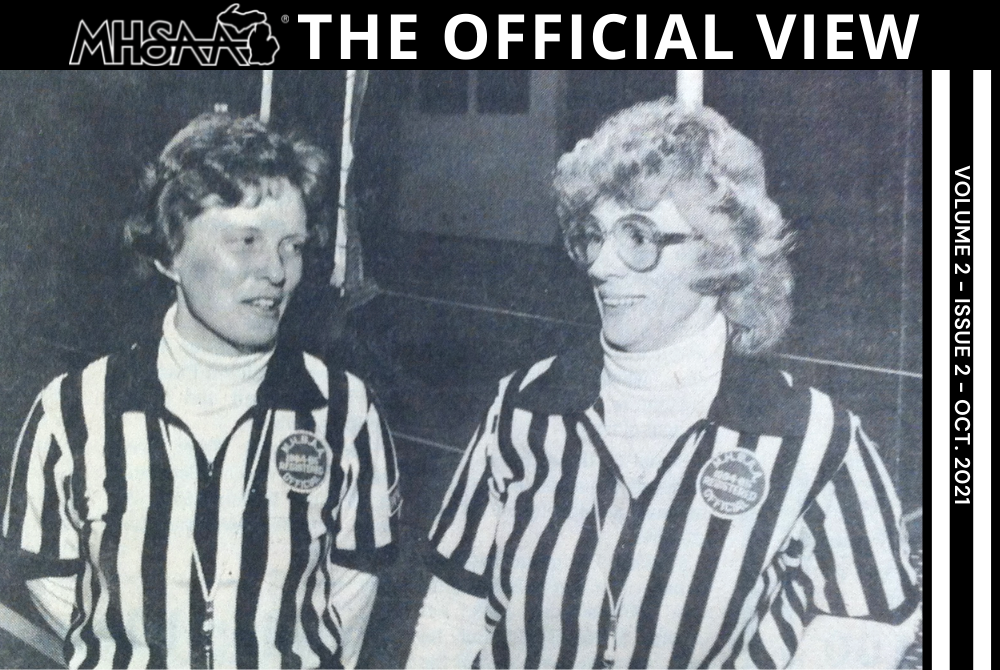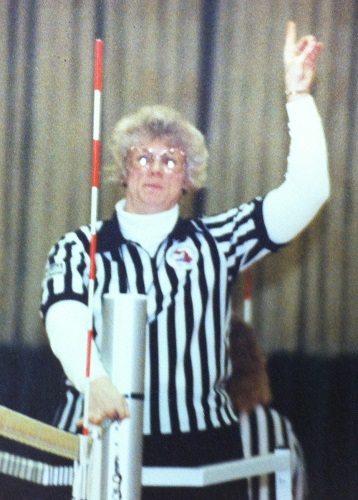
Legacies Live on in Matson's Work
By
Geoff Kimmerly
MHSAA.com senior editor
March 26, 2015
Hugh Matson was a sophomore on the 1951 Newaygo team that made the school's first trip to the MHSAA Boys Basketball Semifinals.
His team faced Dimondale in an auxiliary gym at Michigan State University’s Jenison Field House, but fell 56-54 in overtime when Dimondale scored the first basket of what was then a sudden-death extra period.
He watched the Class D championship game with some disappointment, knowing his team had come so close to playing on Jenison's main floor. But another highlight of that weekend has stuck with Matson, who has given back to high school sports as a teacher, coach, athletic director and official for more than 50 years.
After Matson and his team arrived in Lansing and checked into downtown’s Olds Hotel, they were directed to another room where they were welcomed by MHSAA executive director Charles E. Forsythe. It’s a memory Matson has enjoyed recalling recently – on Saturday, he will receive the honor bearing Forysthe’s name.
Matson will receive the 38th Charles E. Forsythe Award, for his long and various contributions to education athletics, during the first-quarter break of Saturday’s Class A Boys Basketball Final at the Breslin Center.
"That's very important to me. He was the big name in athletic administration when I got into it as an athletic director," Matson said. "He was known all over the United States as one of the great athletic directors, and I really feel honored. I'm humbled by it, naturally."
Forsythe was the MHSAA’s first full-time and longest-serving chief executive. Forsythe Award recipients are selected each year by the MHSAA Representative Council, based on an individual's outstanding contribution to the interscholastic athletics community.
Matson, 79, has deep roots in education. His mother Velma – who died in January at 104 years of age – was a longtime educator in Newaygo and with his father Francis established a scholarship for graduating seniors still awarded today. Hugh Matson took his first teaching job in 1957, at Mattawan, then followed older brothers Bill and Max to Saginaw Township Community Schools, teaching and coaching at Saginaw MacArthur High school from 1962-71 and then Saginaw Eisenhower from 1971-88.
Matson served as head varsity football and track and field coach at Mattawan and as head track and field coach at both MacArthur and Eisenhower, in addition to serving as an assistant football coach at both schools. He also became the first and only athletic director in Eisenhower’s history – holding that position from the school’s first day until the end of the 1987-88 school year, when he became co-athletic director of the new Saginaw Heritage High School, which was created from a merger of MacArthur and Eisenhower. Matson served as the sole full-time athletic director of Heritage for 1996-97 before retiring.
“Hugh has been dedicated to improving athletics in Michigan for more than 50 years, and his contributions stretch over every aspect of our games and beyond the Saginaw area,” MHSAA Executive Director John E. “Jack” Roberts said. “He showed leadership not only in his community for many years but at the statewide level among his colleagues, and continues his involvement as a valued official. We’re glad to honor Hugh Matson with the Forsythe Award.”
Matson has been a member of the Michigan Interscholastic Athletic Administrators Association (MIAAA) since 1970 and served as its president during the 1989-90 school year. He also was a member of the National Interscholastic Athletic Administrators Association (NIAAA) for three decades and has been a member of the Association of Track Officials of Michigan (ATOM) since 1993. Matson received distinguished service awards from both the MIAAA and ATOM and served as a representative and speaker for the MIAAA at regional conferences in Iowa and Wisconsin and to the NIAAA Leadership Forum in 1987.
 During his time as athletic director, Matson hosted MHSAA Districts or Regionals for seven sports. He’s been an MHSAA registered official since 1970 and has officiated 25 MHSAA Regionals in either cross country or track and field and 12 MHSAA Finals. He also has officiated cross country and track and field at the Division I, II and III and NAIA collegiate levels.
During his time as athletic director, Matson hosted MHSAA Districts or Regionals for seven sports. He’s been an MHSAA registered official since 1970 and has officiated 25 MHSAA Regionals in either cross country or track and field and 12 MHSAA Finals. He also has officiated cross country and track and field at the Division I, II and III and NAIA collegiate levels.
“Hugh was excellent with students, parents and staff during his 42 years as a teacher and coach at Eisenhower and Heritage High School. He is extremely positive with the kids as an official,” said current Saginaw Heritage athletic director Peter Ryan, also a member of the MHSAA Representative Council. “Hugh has been dedicated to improving athletics in the state of Michigan, and his passion for athletic officiating is contagious.”
“I still think I have the energy for it, and I enjoy it a lot,” Matson said. “Every day before I go to a track meet, my (wife Jackie) says, ‘Have fun.’ And she says when I come home, ‘Did you have fun?’ And yeah, I have fun. Working with younger people also, it keeps me youthful.”
Matson received his bachelor’s degree in physical education with minors in English and history in 1957 from Western Michigan University. He taught English and history at Mattawan, and then English and physical education during his three tenures as part of Saginaw Township Community Schools. In addition to his mother and brothers, Matson’s sister Joelyn also worked in education, recently retiring from the University of Toledo.
Past recipients of the Charles E. Forsythe Award
1978 - Brick Fowler, Port Huron; Paul Smarks, Warren
1979 - Earl Messner, Reed City; Howard Beatty, Saginaw
1980 - Max Carey, Freesoil
1981 - Steven Sluka, Grand Haven; Samuel Madden, Detroit
1982 - Ernest Buckholz, Mt. Clemens; T. Arthur Treloar, Petoskey
1983 - Leroy Dues, Detroit; Richard Maher, Sturgis
1984 - William Hart, Marquette; Donald Stamats, Caro
1985 - John Cotton, Farmington; Robert James, Warren
1986 - William Robinson, Detroit; Irving Soderland, Norway
1987 - Jack Streidl, Plainwell; Wayne Hellenga, Decatur
1988 - Jack Johnson, Dearborn; Alan Williams, North Adams
1989 - Walter Bazylewicz, Berkley; Dennis Kiley, Jackson
1990 - Webster Morrison, Pickford; Herbert Quade, Benton Harbor
1991 - Clifford Buckmaster, Petoskey; Donald Domke, Northville
1992 - William Maskill, Kalamazoo; Thomas G. McShannock, Muskegon
1993 - Roy A. Allen Jr., Detroit; John Duncan, Cedarville
1994 - Kermit Ambrose, Royal Oak
1995 - Bob Perry, Lowell
1996 - Charles H. Jones, Royal Oak
1997 - Michael A. Foster, Richland; Robert G. Grimes, Battle Creek
1998 - Lofton C. Greene, River Rouge; Joseph J. Todey, Essexville
1999 - Bernie Larson, Battle Creek
2000 - Blake Hagman, Kalamazoo; Jerry Cvengros, Escanaba
2001 - Norm Johnson, Bangor; George Lovich, Canton
2002 - John Fundukian, Novi
2003 - Ken Semelsberger, Port Huron
2004 - Marco Marcet, Frankenmuth
2005 - Jim Feldkamp, Troy
2006 - Dan McShannock, Midland; Dail Prucka, Monroe
2007 - Keith Eldred, Williamston; Tom Hickman, Spring Lake
2008 - Jamie Gent, Haslett; William Newkirk, Sanford-Meridian
2009 - Paul Ellinger, Cheboygan
2010 - Rudy Godefroidt, Hemlock; Mike Boyd, Waterford
2011 - Eric C. Federico, Trenton
2012 - Bill Mick, Midland
2013 - Jim Gilmore, Tecumseh; Dave Hutton, Grandville
2014 - Dan Flynn, Escanaba
The MHSAA is a private, not-for-profit corporation of voluntary membership by more than 1,400 public and private senior high schools and junior high/middle schools which exists to develop common rules for athletic eligibility and competition. No government funds or tax dollars support the MHSAA, which was the first such association nationally to not accept membership dues or tournament entry fees from schools. Member schools which enforce these rules are permitted to participate in MHSAA tournaments, which attract more than 1.4 million spectators each year.
PHOTOS: (Top) Hugh Matson continues as an MHSAA official and has worked at all levels of college as well. (Middle) Matson accepts his induction into the Saginaw Sports Hall of Fame in 2014. (Photos courtesy of Saginaw Heritage High School.)

The Official View: Title IX – Door Opens for Female Officials
By
Brent Rice
MHSAA Assistant Director
October 29, 2021
In the 50 years since Congress passed Title IX legislation in order to create equal educational opportunities, huge strides have been made for female students to participate in athletics.
But the advancement of opportunities wasn’t just for the athletes. It also opened a door which ushered in a generation of female sports officials.
Betty Near is one of those officials whose long and distinguished career as a high school and collegiate volleyball official is a direct result of the opportunities provided through Title IX. Unlike many today who entered officiating after having played the sport, Betty didn’t have those opportunities before first climbing the ladder (literally) in 1971. She was encouraged to take up the sport by Macia Tiesenga (a nationally-ranked collegiate official) who told Betty – who had been involved in athletics recreationally – that athletes make the best officials because of their understanding of competition.
“I’m frequently asked whether I got into officiating because I played volleyball. I tell them I didn’t play because girls volleyball didn’t exist when I was in school," Near said. "I try to share the story of Title IX every chance I get, to show them that they now have opportunities to both play and officiate because of those that came before them.”
Near has spent more than 45 years as a registered MHSAA official and is still going strong. That run has included six appearances as a Finals official. She recalls how at one of those Finals, an injury to her knee created a change in mechanics for the entire state.
“When I first began officiating in the 70s, the MHSAA had the umpires (R2s today) kneel underneath the net to look at blockers," she said. "This was quite dangerous and pretty ineffective.
"Officiating at the collegiate level, I had been trained to stand at the pole and look down the net. With this background, and seeing as my knee was still hurting from an earlier injury, I decided to use this mechanic.”
 Sue Martin, the MHSAA director for volleyball at the time, approached Betty following her match. Near was certain that she was going to receive an earful. Instead, Martin asked the justification for using the mechanic, and they discussed the pros and cons of each. It was ultimately decided moving forward the umpire would take a position standing at the pole.
Sue Martin, the MHSAA director for volleyball at the time, approached Betty following her match. Near was certain that she was going to receive an earful. Instead, Martin asked the justification for using the mechanic, and they discussed the pros and cons of each. It was ultimately decided moving forward the umpire would take a position standing at the pole.
Mechanics changes aren’t the only effect Near has had on the sport. She was instrumental in the start of the West Michigan Volleyball Officials Association in 1984 and continues to help lead and grow that organization (now with more than 125 members). This has allowed her to work with the community, raising nearly $125,000 for scholarships for graduating high school seniors. And one of her biggest contributions remains her role in recruiting and mentoring new officials – especially helping to develop the next generation of female officials.
“Mentoring is a gratifying thing,” said Near, “especially when I receive emails or calls thanking me for helping them understand specific rules or situations and improving their skill sets. Watching someone I have mentored over 20 years work her way up to officiate multiple state tournaments (pleases me).”
Now officiating primarily at the college level, Betty still reserves Thursdays during the season to officiate MHSAA contests. She does this for the purpose of staying connected to high school students and officials and to build on the growth of female registered officials, though she also recognizes that challenges remain for female officials advancing through the system.
One of the natural barriers that apply to women more often than men is that women who begin families sometimes find difficulties continuing to officiate with their other responsibilities. While home lives can be difficult to navigate (for both women and men), officiating school sports provides a flexible alternative to stay active, remain involved in athletics, give back to the community, develop camaraderie and earn some extra cash.
Another hurdle that Near identifies for female officials, unfortunately, is a continuation of the “good ol' boy network.” She is reminded of a not-so-distant-past example when she and another female official had been selected to officiate the Regional round of the MHSAA Tournament; and even though both were well-established collegiate officials the host athletic director insisted that less-experienced male officials work as the R1 and R2 and the women work as line judges because the men would have better control of the tough matchup.
Of course, that kind of mindset isn’t based in fact, and many of the MHSAA’s best officials in all sports are women. Especially in girls sports, it is important that the student athletes see officials who represent them; but the MHSAA seeks female officials in all sports, including those dominated by male participants. This year will once again include a female officiating in the MHSAA Football Finals. Female officials also have worked Finals in baseball, boys basketball, ice hockey and wrestling.
The door that was opened for women and girls with the passing of Title IX a half-century ago only provides the opportunity. Capitalizing still requires stepping through the door to take full advantage of the opportunities provided. Near wants to encourage anyone to join the avocation of officiating, but especially young women.
“My hook is that the officiating is fun, and it is an activity that can be an avocation that can pay (in many ways) throughout their lifetimes," she said.
It’s Official!
Postseason Assignments: Officials assignments for fall sports tournaments have been released. Congratulations to all selected to officiate this year.
Speaking of tournament assignments, a change will be made this year that allows basketball officials to submit their availability to work together as a crew. Crews can be set for the boys and girls tournaments separately. The hope is that this will encourage more officials to seek postseason consideration, knowing they can choose with whom they will officiate. Eligible individuals not included with a crew will be assigned a crew by MHSAA staff.
For all winter sports officials, make sure to complete all requirements for postseason consideration. Please remember that officials in basketball, competitive cheer, gymnastics, ice hockey and wrestling must opt-in to the tournament by indicating their tournament availability dates HERE. All additional requirements such as completion of tournament exams and submission of regular-season schedule also remain in place.
Officials Review Committee: The Officials Review Committee, consisting of school administrators, officials and assigners from around the state, convened in early October to discuss issues and concerns involving officiating. A number of proposals were made to the MHSAA Representative Council. You can find these and other discussion items by reviewing the minutes HERE.
Know Your Rules
SOCCER A player (#7) is injured and must leave the field. His team elects to play short-handed. If #7 heals up, when can he return to the field? What if they wish to replace him with #12?
RULING If #7 comes back into the game, he only needs to wait until the next stoppage of play. If he will be replaced by #12 though, #12 can enter the game only at the next legal substitution opportunity.
It’s Your Call
REVIEW Last month’s play involved a suspect block by a defensive player (found here). The block by B17 is correctly flagged for an illegal block below the waist. While not widely known by spectators, blocks below the waist (except for linemen immediately at the snap) are illegal for players on both sides of the ball. In this case, since the block was by the defense, the penalty is enforced 15 yards from the end of the run.
VOLLEYBALL Officiating ball handling is the topic of this month’s "It’s Your Call." This rally ends following the pass of a back-row player. What’s the call?

